Archives and Special Collections: Case Studies
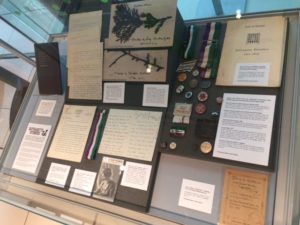 Eastern Arc is home to world class archives and special collections. Our radical founding principles allowed us to think differently about what should be preserved, and how it should be curated.
Eastern Arc is home to world class archives and special collections. Our radical founding principles allowed us to think differently about what should be preserved, and how it should be curated.
For more than fifty years researchers and members of the public have been able to access these, and use them in a huge diversity of ways. Here we give some case studies as to how they have done so.
To find out about our collections more broadly, go to our archives and special collections page, where you can browse our holdings through thematic groups.
-
Starting in 2015, academics from the University of East Anglia (UEA) and The East Anglian Film Archive (EAFA) have collaborated on a research and public engagement project, Women Amateur Filmmakers in Britain (WAF).
Cataloguing the collection
EAFA holds on deposit the internationally renowned Institute of Amateur Cinematographers (IAC) collection and in 2015 was successful in securing a cataloguing grant from The National Archives to catalogue the innovative work of women filmmakers from this collection.
The TNA funding enabled EAFA to catalogue 150 films, while the IAC funded the digitisation of the WAF films – allowing them to be publicly accessible via eafa.org.uk for the first time. The catalogue records and project details can be viewed on our website.
Public screenings and silent scores
Between 2016 and 2019, Professor Keith M. Johnston and Dr Sarah Hill arranged a series of public screenings of selected WAF films across the UK, as well as screenings at public exhibitions in London and Norwich, and at a 2018 UEA symposium held at EAFA.
In 2018 Professor Keith M. Johnston successfully secured funding to commission silent film composer Laura Rossi to produce new musical scores for three of the WAF films: Cat 3823 Sally Sallies Forth (Frances Lascot, 1928), Cat 4086 The Polite Burglar (Sadie Andrews, 1929), and Cat 3256 Doomsday (Ruth Stuart, 1934). These new scores were performed live at screenings in 2019, and then recorded and synchronised to the films to create new master copies.
Broadcasting
During 2019 Professor Johnston, Professor Melanie Williams, and EAFA worked with Talking Pictures TV (TPTV), the UK’s leading archive TV channel, to select and licence some of the best films from the collection, including the three silent films with new scores, as well as other films from the 1930s through the 1980s.
National mapping of films by women
Ten films have been screened multiple times on TPTV, which in 2021 is achieving audience figures of over 6 million per week, allowing the project to reach a much wider audience. The success of the project’s research led Film Archives UK (Film Archives UK) to commission the team to conduct a wider mapping of women filmmaker’s work held in regional and national film archives. Led by Professors Johnston and Williams, with help from Dr Stephanie Clayton, this national survey included other elements of EAFA’s non-IAC collections.
The findings of this audit were interpreted and published in March 2020 by Professors Johnston, Williams and Dr Clayton in Invisible Innovators: Making Women Filmmakers Visible Across the UK Film Archives. This analysis of catalogue records from across UK-based film and media archives offers a fuller account of women filmmakers, creating an expanded dataset of over 2250 films, and 158 women filmmakers. The full report can be viewed here (pdf).
The report identified a need for women filmmakers ‘to be more publicly visible within regional and national archive holdings’ and ‘identifiable and visible within cataloguing metadata’ (Clayton, Johnston and Williams 2020: 29). It concluded that existing location-based approaches to collections metadata had created conditions where gender-based issues were regularly overlooked within archival taxonomies, and that tackling this issue would require a more feminist-led approach to cataloguing. This confirmed individual film archive awareness of the practical difficulties in converting a commitment to women filmmakers into practical actions and the limitations of recognised archival standards.
Given the success of this project since 2015, EAFA/UEA is actively working on developing plans for the next phase of the Women Amateur Filmmakers in Britain (WAF).
If you want to find our more about our work, go to our website or get in touch directly with us directly.
-
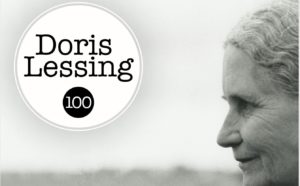 An innovative exhibition to celebrate the centenary of the Nobel Laureate, Doris Lessing, was held at the Sainsbury Centre in 2019-20 drawing on her vast archive of correspondence and working papers which are held at the University of East Anglia’s British Archive for Contemporary Writing (BACW).
An innovative exhibition to celebrate the centenary of the Nobel Laureate, Doris Lessing, was held at the Sainsbury Centre in 2019-20 drawing on her vast archive of correspondence and working papers which are held at the University of East Anglia’s British Archive for Contemporary Writing (BACW). Using visual art, objects from Lessing’s life and loans from The National Archives (TNA) and the National Portrait Gallery as well as from private collections, alongside documentation from her archive, the exhibits told the story of Lessing’s extraordinary life and an incredible intellectual journey which saw her move to London from Southern Rhodesia (now Zimbabwe), travel to communist Russia, embark on a spiritual awakening though her studies of Sufism, visit refugee camps in Afghanistan, grapple with feminism and meet with NASA scientists.
The exhibition was curated through a close and innovative working partnership between colleagues from the School of Literature, Drama and Creative Writing, the Sainsbury Centre and the BACW.
An international conference of writers and scholars from four continents came together to consider the exhibition and reflect on Lessing’s legacy. A range of public events and activities took place over the six months including: writers’ panel events, readings, film screenings, satellite exhibitions within public libraries and public reading groups. The programme received national television, radio and press coverage.
To find out more about our work and our collections and how we might collaborate email archives@uea.ac.uk or visit the BACW site. For more on the Doris Lessing 100 events, click here, and the Lessing archive at BACW here.
-
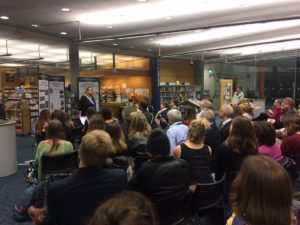 In 2018, to coincide with celebrations marking one hundred years of votes for women in the UK, the British Archive for Contemporary Writing (BACW) and the School of Literature, Drama and Creative Writing at UEA, were awarded National Lottery funding to embark on an innovative public engagement project, drawing on the institution’s unique suffragette archives.
In 2018, to coincide with celebrations marking one hundred years of votes for women in the UK, the British Archive for Contemporary Writing (BACW) and the School of Literature, Drama and Creative Writing at UEA, were awarded National Lottery funding to embark on an innovative public engagement project, drawing on the institution’s unique suffragette archives. Annie and Jessie Kenney were two sisters from a large working-class family who moved from factory work in Lancashire to leading national roles in the campaign to win the vote working in close partnership with the Pankhursts and other major figures in the movement. The Kenney Papers are an important source in highlighting the major contribution of working-class women from 1905-18.
The project had three distinct strands.
An online short story anthology
Project co-ordinator and writer in residence, novelist Fiona Sinclair, discovered tree clippings in the archive at UEA which had originated from a suffragette tree plantation on the former Blathwayt Estate, Eagle House in Bath. Suffragettes recovering from imprisonment, and often force feeding, would stay at the estate and plant a tree as part of their recuperation. The plantation, known as Annie’s Arboretum, after Annie Kenney, was torn down in the 1960s to make way for housing and only one tree remains. The anthology invited submissions from authors and members of the community to write stories inspired by archive material and the lives of the suffragettes whose trees had been uprooted.
A digital exhibition
100 items from the archives of Annie and Jessie Kenney were digitised and shared online for the first time. The exhibits were also taken into schools and local libraries to prompt storytelling and reflections on women’s equality over the past century.
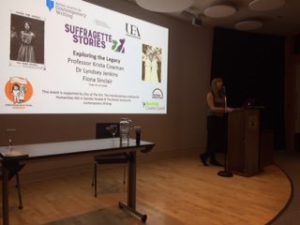 Local library exhibitions
Local library exhibitions A series of intergenerational workshops were held between school children and older adults which considered archive exhibits as well as other historically and personally significant moments in the lives of participants who had faced inequality. Personal stories were recounted to children who transcribed responses and exhibitions were curated in local libraries combining archive exhibits alongside personal memorabilia marking these important experiences in the battle for equality.
A series of public events were held, including a launch event for the short story anthology, which provided debut writers with an opportunity to read their stories alongside published writers.
To find out more about our work and our collections and how we might collaborate email archives@uea.ac.uk or visit our website. To find out more about the project itself our dedicated Suffragette Stories site.
-
In 2019, The Gulbenkian, the University of Kent’s Arts Centre, celebrated its 50th anniversary. Support from the National Lottery Heritage Fund was secured to help run Radical Roots and Dangerous Ideas, a youth-led project responding creatively to the archives of Gulbenkian and the University and how they linked up with new ideas about authority and protest in the era of social media and the internet.
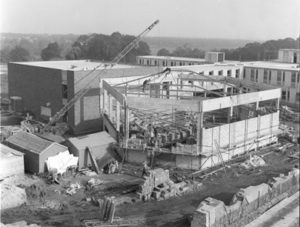 The Gulbenkian opened in June 1969 as the University’s theatre and arts centre. It takes its name from the Calouste Gulbenkian Foundation, which donated the majority of the construction funds. The committee in charge of the Gulbenkian hoped to demonstrate ‘the possibilities of low-cost theatre building for universities’, hosting a varied programme for students and the general public
The Gulbenkian opened in June 1969 as the University’s theatre and arts centre. It takes its name from the Calouste Gulbenkian Foundation, which donated the majority of the construction funds. The committee in charge of the Gulbenkian hoped to demonstrate ‘the possibilities of low-cost theatre building for universities’, hosting a varied programme for students and the general publicThe first production, The Exploding Dream, by playwright Richard Drain, responded to the revolutionary atmosphere on campus by re-imagining the story of Guy Fawkes. Drain’s avant-garde play was chosen by the Gulbenkian’s young Director, Mike Lucas, as an attempt to shake up the Canterbury establishment and bring the radical tendencies of the University’s students to the local community. The play contained full-frontal male nudity and dialogue calculated to shock. The Gulbenkian had made a name for itself in its opening performance, though later productions were more conservative.
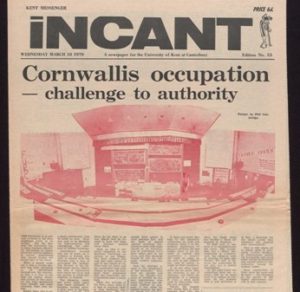 In Radical Roots, we were interested in how the Gulbenkian and University’s past spoke to young people half a century on. What does it actually mean to be ‘radical’? Were their forebears more or less ‘radical’ than they were?
In Radical Roots, we were interested in how the Gulbenkian and University’s past spoke to young people half a century on. What does it actually mean to be ‘radical’? Were their forebears more or less ‘radical’ than they were?Many of the struggles engaged with by students and artists of the 1960s seem almost obvious to young people today: from gender and racial equality, LGBTQ rights, to democratising our experience of culture and exploring marginalised social voices in the arts and media. Only days before the project began, several of the students had picketed their schools on climate strike, or travelled up to London to protest Donald Trump’s state visit to Britain.
Rather than feeling that the struggles of the 1960s were remote and to be taken for granted, the participants responded to the energy spread among the letters, magazines and ephemera they discovered in the archive. A series of workshops led to the creation of oral history interviews with staff and students involved in the Gulbenkian’s establishment, a student-curated exhibition, a zine of creative responses to the archive, and a volunteer project to repackage and list the Gulbenkian archive.
To find out more about our work and our collections and how we might collaborate email specialcollections@kent.ac.uk or visit our website.
